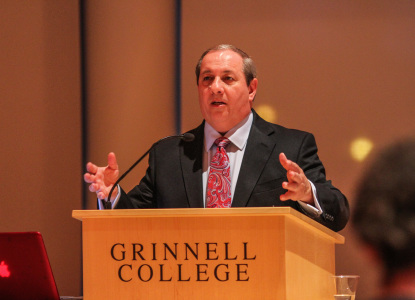On Monday, Nov. 10, George A. Lopez, a founding faculty member of the University of Notre Dame’s Kroc Institute for International Peace Studies, delivered a lecture titled, “With All the World’s Violence, Where is Peace?” in JRC 101.
Lopez’s research focuses primarily on state violence and he has worked with the United Nations to develop state sanctions in the past. The Grinnell College Peace and Conflict Studies Program sponsored Lopez’s talk.
Lopez’s expertise stems from his current role as a Vice President and Director of the Academy for International Conflict Management and Peacebuilding at the United States Institute of Peace in Washington D.C. After working at the Kroc Institute for 27 years as a founding member and professor at the institution, Lopez is a qualified instructor and expert involving issues of economic sanctions, state violence and human rights. He has also served as an adviser for various foundations and organizations with similar backgrounds.
Through their collaboration with the Kroc Institute, Grinnell College faculty members were able to reach out to Lopez and work with him to not only provide an opportunity for him to speak, but to teach a Peace Studies course alongside another professor.
In fact, Lopez will be coming back to Grinnell next fall for the opportunity to team-teach a course called Introduction to Peace and Conflict Studies, where he would be partnered with a Grinnell faculty member and share his expertise on his studies and allow it to be further developed by his partner.
Simone Sidwell, the Coordinator of Grinnell’s Peace and Conflict Studies Program, stated that Grinnell students have requested this course frequently.

Photo by Aaron Juarez.
“It’s been estimated that we’ve been hearing for a good seven to eight years from students [about] how much they would like a peace and conflict studies concentration,” she said.
According to Sidwell, program coordinators wanted to allow Lopez to “meet students and get a sense of the student body at his talk as well as lay the groundwork for his upcoming class next fall.”
During his talk, Lopez commented on the violence and war going on around the world and discussed how, as a member of the United States Institute of Peace (USIP), he and various coworkers hope to vie for peace as a real and viable dynamic. The USIP is a congressionally created and taxpayer supported institution that as Lopez said, “[tries] to be helpful in preventing, mitigating and after the fact, reconciling parties in violent conflict.”
According to Lopez, USIP has tried and trained civil society members, including 150 women from Iraq, to be community mediators and conflict resolvers in their homelands. Due to their efforts, they have managed to train many people to professionally act as mediators that can teach peace in a land of war, Lopez said.
However, Lopez stated that lower death rates did not tell the story of the division of casualties, with particular attention to the death of noncombatants.
“Wars are declining and the overall big deaths on war are declining […] the percentage of those who are dying has increased in the civilian zone,” Lopez said.
According to Lopez, these declines are invisible because there is a huge focus on the victimization of non-participants in war. This victimization leads people to ask, “Where is peace?”
To prevent the outbreak of war, Lopez claimed that we have to strengthen international collaboration for peacekeeping, increase economic development to properly keep up security and social satisfaction and encourage the participation of youth in peacekeeping activities. He argued that civil society actors are those who make the impact on the road to ending war. In closing, Lopez stated that peace thrives among those who help define the methods to build peace, those who engage in moving in and out of the greater institution to reach peace, and fundamentally among the members of the audience where peace studies programs have thrived from their attention.
The new course, Introduction to Peace and Conflict Studies, will be a four-credit course available fall 2015. Another course of the same name is listed for spring 2015. The instructor for that course is yet to be determined.



















































